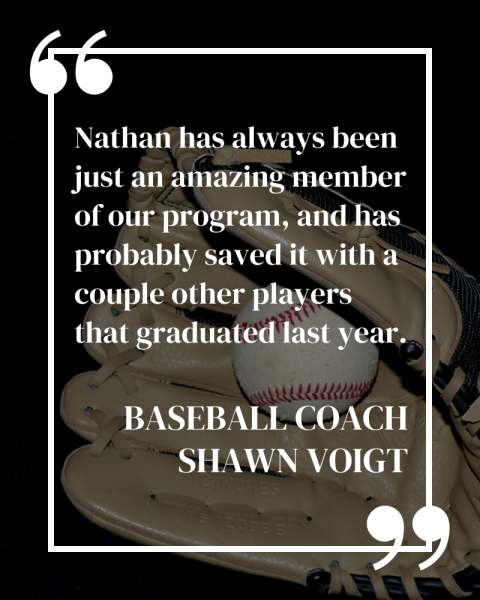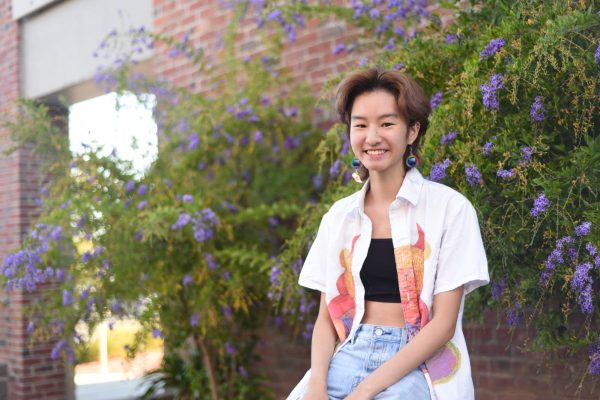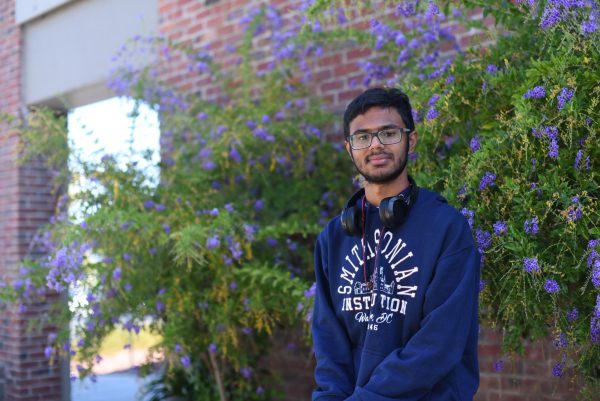For as long as he can remember, senior Nathan Liu has lived with eczema. From an early age, he has taken antibiotics and tried to keep the scratching at a minimum, but his relationship with the condition has shifted over the years.
“I was diagnosed really early on, per my parents,” Liu said. “It was when I was 6 months old, when we went to Taiwan. That’s when they found out I had eczema, and ever since I’ve been with it.”
Eczema, which encompasses seven types of inflammatory skin conditions, affects around 30% of the US population. Symptoms include persistent rashes and itchy skin, but the condition can fluctuate based on environmental factors. Liu’s condition has also changed throughout his life, and he recalls that the worst period for his eczema was between third and seventh grade.
“I would have rashes all around me like on my face or my neck or on my arm, basically almost anywhere that you could see,” Liu said. “During my better times in eighth and ninth grade, there would be very minor rashes anywhere. Nowadays, no matter how much moisturizer or lotion I put on, my face is always dry so it doesn’t really help much anymore.”
Apart from the fluctuating condition of his eczema, what Liu notes is how his physical restrictions often translated to social restrictions. Liu was unable to play on grass when he was young, limiting his ability to hang out with friends. His earliest memories involve hiding his skin and “acting normal” to not attract too much attention, especially alongside his food allergies, which he says limited his ability to grow taller.
“Having eczema and also having severe food allergies made growing up a bit difficult because I’d be the shortest person most of the time,” Liu said. “And so oftentimes, I would either get bullied for my height or how I looked … I think I was called a troll once.”
Although Liu tries not to let it bother him anymore, he acknowledges that the stigma surrounding eczema still exists.
“I think the stigma that people have around people with eczema is that it’s contagious even though there isn’t any contagious part of it,” Liu said. “And also the misconception that we can’t do a lot of stuff, but in reality we can — sometimes we feel uncomfortable or we get uncomfortable doing it.”
For example, while Liu’s eczema can make standing out in the sun or sweating especially uncomfortable, it doesn’t entirely prevent him from playing baseball. He has become experienced in finding solutions to these problems, such as applying more sunscreen and taking time to cool off away from the sun.
Despite living with the condition, Liu currently plays for the school baseball team, having started in fourth grade when his friend introduced him to Little League. While he plays for fun rather than competitively, Baseball coach Shawn Voigt appreciates the role Liu plays on the team.

“Nathan has always been just an amazing member of our program, and has probably saved it with a couple other players that graduated last year, going into COVID,” Voigt said. “He kept the momentum going, led fundraising, led recruitment efforts … I’ve really appreciated it since day one.”
Aside from baseball, Liu is also involved in the MVHS Girls Basketball team, acting as the team manager and TA for English teacher Sara Borelli, who is also the Girls Basketball coach. As the team manager, he updates the team statistics and MaxPreps page, and his efficiency helps Borelli focus on other tasks.
“He anticipates what I need, and just gets it done for me,” Borelli said. “As my TA, it’s the same thing. If I need anything done, it’s always like, ‘Nathan, can you get this done? Nathan, we have to do this. Nathan, we have to do that.’ And so he keeps me on my toes and keeps me organized.”
Borelli has known Liu even before he attended high school, as he often showed up to his sister’s basketball games. Over time, she came to know him as a helpful and outgoing person regardless of his eczema.
“I think he’s very mature in regards to the way he handles his eczema,” Borelli said. “He doesn’t complain about it. I know it affects him, but he’s not somebody that complains and allows it to change who he is as a person.”
While Voigt also acknowledges that he doesn’t have eczema himself and therefore can’t speak for how Liu feels about it, he empathizes with how difficult it must be, especially during baseball games..
“We’re out in the sun for hours at a time,” Voigt said. “I admire his ability to just go out there and not let it affect him when I’m sure that it is probably really bothersome … He could totally just take time off and recover, and we’d all be like, ‘Okay, take however much time you need,’ but he’s always trying to be working with the team and getting better … I would probably be complaining, being out there half the time that he is, but he wants it. And we appreciate that. Our team is better because of that.”

Through his various experiences, Liu has observed that other people’s focus on his skin limits his ability to share who he really is, and that he has more to offer beyond that.
“I think the only thing I really wish people had known is to not think that I would be afraid to talk about it,” Liu said. “I feel like if they had come and asked me I would be more open to talk about it, instead of them going right off the bat by saying, ‘Why does your skin look like that?’ with some negative connotation. I feel like there are better ways to get to know me.”












